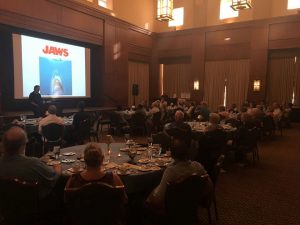Graduate Studies
Ph.D. in Communication

Welcome to the doctoral program in the Department of Communication at the University of North Carolina at Chapel Hill. Our program embraces interdisciplinary approaches to communication, merging insights and training from multiple perspectives: media and technology studies, media production, cultural studies, performance studies, interpersonal and organizational communication, and rhetorical studies. We draw upon multiple methodological perspectives, including ethnography, documentary filmmaking, discourse and rhetorical analysis, and embodied and creative praxis. The Ph.D. at UNC is an inquiry-based degree, offering students the opportunity to build unique programs of study around their respective research interests.
Why UNC?We offer a robust interdisciplinary program that encourages students to work across subfields to craft innovative, problem-based research projects. |
Research OpportunitiesStudents collaborate on faculty research projects, join vibrant research teams, and frequently co-author with faculty members. |
|
StudentsJoin a community of approximately 50 doctoral students specializing in critical, socio-cultural, and aesthetic approaches to communication. |
Graduate AdmissionsWe encourage prospective students to explore the admissions information below. We accept students only for the Fall semester. The deadline for Fall applications is December 12. |
Student Experiences |
 Doctoral students (admitted with M.A. or equivalent) complete a minimum of 48 hours of coursework, including 4 core courses (12 hours), 10 research courses (30 hours), 2 professional development courses (COMM 702 and COMM 907 for 6 hours). Dissertation research hours are additional. Students admitted with a baccalaureate degree or equivalent take additional coursework and complete a qualifying exam in their third semester. A student may also wish to pursue formal or independent minors or certifications, language competence related to research, and/or additional courses as needed or desired. All students must demonstrate methodological competence through completion of a course relevant to the dissertation project.
Doctoral students (admitted with M.A. or equivalent) complete a minimum of 48 hours of coursework, including 4 core courses (12 hours), 10 research courses (30 hours), 2 professional development courses (COMM 702 and COMM 907 for 6 hours). Dissertation research hours are additional. Students admitted with a baccalaureate degree or equivalent take additional coursework and complete a qualifying exam in their third semester. A student may also wish to pursue formal or independent minors or certifications, language competence related to research, and/or additional courses as needed or desired. All students must demonstrate methodological competence through completion of a course relevant to the dissertation project.
SPECIAL NOTE If you are interested in public relations, advertising, journalism and related mass communication fields, please contact the graduate program in the School of Journalism and Mass Communication.
Cultural Studies @ UNC
Director: Dr. Kumi Silva
Cultural Studies @ UNC encourages the examination of those areas of cultural knowledge where disciplines overlap, intersect, and collide, producing productive debate, fruitful collaboration and disciplinary self-reflection. It emphasizes the multiplicity and variety of cultural formations and practices both within American society and around the world and insists upon the historical and geographical specification of both “culture” and specific cultural practices within cultural studies. Cultural Studies @ UNC provides opportunities for faculty and students from disparate disciplines to engage in discussion, teaching and research across common interests in questions of culture and power. It provides opportunities for students and faculty to encounter and engage with theories and methods that might open up new ways of approaching their own research and teaching. Cultural Studies @ UNC is designed to serve both undergraduate and graduate students, as well as the faculty of the University of North Carolina at Chapel Hill, and the other universities of North Carolina. It offers the opportunity for an undergraduate major and graduate certificate in cultural studies. It supports interdisciplinary courses, both individually and jointly taught, at both the undergraduate and graduate levels, and encourages new and experimental models for teaching). Every institutionalization of cultural studies is defined by the intellectual resources of its particular faculty and the traditions they represent. CS@UNC draws on and serves a unique combination of disciplines, including communication, anthropology, sociology, history, geography, international and area studies, African-American studies, law, art, English, education, medicine and public health. The strong presence of the historical, social and biological sciences especially distinguishes UNC’s program in Cultural Studies. CS@UNC seeks to bring the excitement, fluidity and relevancy of cultural studies research into the classroom, by combining curricular and programmatic concerns, and by placing pedagogical commitments at its center.
History of Cultural Studies @ Carolina
Cultural Studies @ UNC was established in July of 1995, quickly attaining state-wide, national and international prominence for its encouragement of interdisciplinary research and education in cultural studies. Since its inception, the Program in Cultural Studies at Carolina has hosted nationally and internationally renowned scholars including Stuart Hall (1932-2014), Catherine Hall, Tony Bennett, Paul Gilroy, Vron Ware, Johannes Fabian, Henry Giroux, Dick Hebdige, Anne Balsamo, Lisa Cartwright, Paul Farmer, Bruno Latour (1947-2022), Allan Young, and Paula Treichler, and hosted numerous conferences, workshops, and programs.
The Graduate Certificate in Cultural Studies
Cultural Studies @ UNC administers a concentration certificate for both MA and doctoral students who wish to augment their field of study with interdisciplinary study in cultural theory and methods. Students are expected to achieve fluency in several critical, cultural theories in relation to a variety of research problems, a reflexive attitude toward theory and methodology that reflect current and historical issues in Cultural Studies, and an ability to conduct interdisciplinary research: to engage perspectives and empirical studies from diverse disciplines rigorously and productively.
Requirements
• Meet with the director of CS@UNC.
To make an appointment, please email Dr. Kumi Silva at kumi@email.unc.edu
• Declare intent to complete a graduate certificate by writing a letter of intent. This
document should include a description of your research interests/research questions and
their connection to cultural studies. This is not meant to “weed out” potential recipients, but to
help us connect scholars in the CS community who have similar interests.
• Determine your Cultural Studies adviser. You are required to have a cultural study
adviser while earning the Graduate Certificate in Cultural Studies. It is recommended that
you meet periodically with your CS adviser to discuss your course of study and your
relationship to the project of cultural studies (especially as it is reflected in your research
project and your teaching goals). These meetings are not required and will in no way be
monitored. While your CS adviser may be on your MA/PhD committee this is not required.
• Complete 5 required courses including: One (1) graduate-level course explicitly devoted
to Cultural Studies (Comm 700 or another course approved by the certificate director); if you
are unsure of whether a course meets this requirement, please contact your cultural studies
adviser or the director of CS@UNC*. Four (4) graduate-level courses selected in
consultation with your CS adviser and the program director, two (2) of which must be from
outside your home department. These courses should be interdisciplinary, theoretically
grounded, and connected with Cultural Studies even if not directly framed in those
terms. Students are strongly encouraged to include work on questions of cultural/social
difference, political economy, and contemporary cultural theory.
• Email a description of your completed courses to kumi@email.unc.edu. Be advised
that you CANNOT receive your certificate until this step is completed.


